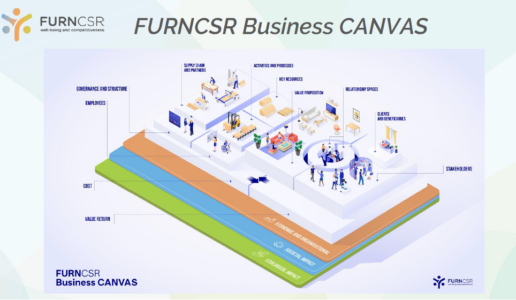FURNCSR – Social Return on Investment – Workshop with the experts

On the 12th of July 2022 we held online the FurnCSR workshop with the experts, in order to comment, verify and improve the general framework for the Social Return on Investment for the furniture industry.
The Experts, selected among the large number of responders of the previous FurnCSR massive survey, represented different countries (Italy, Spain, Belgium, Germany, Ireland, Turkye, Latvia, the Netherlands, Slovenia, Latvia, Portugal) with different and specific business environments.
The workshop presented the presented the main results of the survey, commented by the two external experts involved in the project: VECTOR 5 showed the general Canvas model that allows the connections between the dimensions of CSR and the benefits expected by different stakeholders to be shown graphically. The environmental, social, and economic/organizational impact results in different activities for each kind of stakeholders. Every business activity impacts the environment, society, and the general economy of the environment to which it is connected. Some of them have been deemed crucial to common sustainable development.
For the environmental impact, the most relevant are:
- Waste management and prevention
- Lifecycle, ecodesign and circular economy
- People centered design
- Measures for controlling emissions and noise
Regarding the relationship with the employees, it is crucial:
- to promote and act equal opportunities and inclusion
- to guarantee a healthy working environment
- to be committed for a sustainable work position and a proper work/life balance.
The top rated activities in the fields of Governance and Structure and Business key resources were:
- Internal communication and knowledge management
- Selection and monitoring of suppliers
- Raw materials and supplies selection
A relevant number of good practices coming from all EU Countries have been selected and commented, along three different CSR dimensions: environmental, social, economic and labour market oriented.
The SMEs and leading companies EU system is already well on the way and many cases can inspire a common transition towards a systemic CSR pathway.
The second presentation, by Woodwize, introduced the results about the survey on skills, knowledge and competences required for the job profiles relevant for the CSR implementation in companies.
The top rated skills for CSR managers were:
- Promote environmental awarness
- CSR knowledge
- Promote innovation
- Shape corporate culture
- Establish collaborative ralationship
- Monitor social impact
- Advise on sustainable management policies
- Apply change management
In summary, CSR is an extra role of the organisation that impacts all the business areas. The profile requires a bachelor degree and it is driven by strong and specific values and by specific knowledge about circular economy, innovation, communication, strategy. An extra support to train the CSR managers is needed, both by external experts and coaches, for 24 or 48 hours.
Regarding the transversal skills, the most rated were:
- Processes information, ideas and concepts
- Thinking creatively and innovatively
- Taking a proactive approach
- Demonstrating willingness to learn
- Collaborating in teams and networking
- Following ethical code and conduct
After the presentations, all made their contributions with a wide-ranging and insightful discussion, enriched by individual experiences and references to their own business context.
CSR is one of the main challenge for any industry. The furniture sector is ready to improve business models and stakeholders’ relationships for achive common and relevant benefits.
